Ukraine: Professor warns 'similar invasion' of Taiwan from China
We use your sign-up to provide content in ways you’ve consented to and to improve our understanding of you. This may include adverts from us and 3rd parties based on our understanding. You can unsubscribe at any time. More info
As leaders and members of the public speculate about the increasing possibility of a Chinese invasion of Taiwan, a discussion reignited by Russia’s invasion of Ukraine, US think tank The Conference Board (TCB) has said an invading force would have massive challenges to overcome.
Taiwan, formerly the island of Formosa, was the last stronghold of Mao Zedong’s triumphant Communist army after elements of the defeated nationalist Kuomintang military retreated to the eastern island in 1949.
The invasion of the self-ruled island, officially the Republic of China (ROC), has been considered by Chinese military planners for decades. However, under President Xi these concerns have intensified.
Xi and Putin’s declaration of a “no limits” friendship between China and Russia — before the Tokyo Olympics and shortly before Moscow launched its full-scale war on Kyiv — set off alarm bells around the world.
Onlookers have since drawn inevitable parallels between the war in Ukraine and Taiwan’s situation.
But, according to David Hoffman, the TCB’s senior vice president for Asia, the conflict in Eastern Europe is serving as a “stern reality check” on Chinese military confidence and preventing — rather than encouraging — similar action by Beijing in the near future.
He added that an invasion effort would be of “exceptionally high risk”.
READ MORE: New Chinese hypersonic missile launched to ‘deter foreign ships’

The Kremlin’s “very visible struggles” in gaining territory in Ukraine, Mr Hoffman outlines in Taiwan ≠ Ukraine: A Pragmatic Assessment, are likely to be putting Xi off any possible plan.
He said in the report: “The way the Ukraine situation is developing for Russia makes the probability of a Chinese invasion and occupation-type move on Taiwan in the near-term more remote, not less.”
Threats of military action against Taiwan, which has had no seat at the United Nations for 50 years, have escalated during periods when some Taiwanese political parties have debated whether to declare independence.
Xi’s explicit narrative that “Taiwanese independence separatism” was “the most serious hidden danger to national rejuvenation” exacerbated the stakes that China might use force to take the island.
Yet, much plays against the president’s potential plans today.
It is argued that China’s combined force military is far from ready for an attack like that of Russia’s on Ukraine, that the West’s support of Kyiv could be echoed in Taiwan, and that sanctions, with subsequent economic pain, could severely damage the nation.

China, currently the world in trading and manufacturing power, could lose it all.
As per Mr Hoffman, who manages the China Center for Economics & Business, officials would only risk doing so “if they believe they can do so without serious consequences, notwithstanding any manner of prior commitments, treaties, or verbal diplomatic assurances”.
The military conflict in which Putin has embroiled Russia has, in fact, hinted at certain lines Beijing seems unwilling to cross.
Ambassador Qin Gang told state-backed broadcaster Phoenix TV on March 23, a month into Moscow’s invasion: “China and Russia’s cooperation has no forbidden areas, but it has a bottom line.
“That line is the tenets and principles of the United Nations Charter, the recognised basic norms of international law and international relations.
“This is the guideline we follow in bilateral relations between China and any other country.”
DON’T MISS
Kremlin ‘targets NATO supply line’ in escalation of war [INSIGHT]
Where would Russia nuke the UK? Key targets [ANALYSIS]
Russian generals look to oust Putin over tensions within Kremlin [REPORT]

Since the start of the war, China has sought to portray itself as neutral.
It has issued statements supporting Ukraine’s sovereignty and expressing concern about civilian casualties, all while supporting Putin at the United Nations and blaming the US for provoking the conflict by expanding NATO presence.
Mr Qin’s remarks, though, marked the first from a Chinese official clarifying the joint statement released by Beijing and Moscow which raised fears of a renewed China-Russia bloc.
Mr Hoffman explored the idea “that Russia’s invasion of Ukraine will embolden China to act sooner than later and via a similar, invasion-type approach”.
His report, published last month, read: “While Beijing is undoubtedly watching Russia-Ukraine events closely to inform and update its geostrategic and military assumptions, this assertion is challengeable in several critical aspects.”
Despite Mr Hoffman’s hopeful forecast, the debate about Taiwan’s readiness for a potential Chinese invasion has revived since February 24.
In March, the island’s defence ministry said it was considering extending compulsory military service for young citizens to a year in an apparent reversal of its years-long transition from conscription towards a fully voluntary military.
The government has also been increasing defence spending and its weapons procurement from the US.
Chiu Kuo-cheng, the defence minister, said the current system of four months’ mandatory training was “inadequate” in the event of a military conflict, and that the department would review and report on a proposal for extension as well as, possibly, consider expanding conscription to women.
Source: Read Full Article





